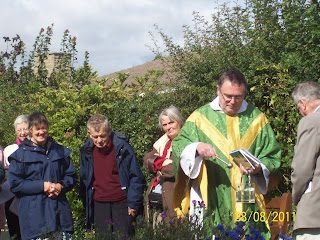On Saturday 1 October over one thousand campaigners from the north of England will gather at Manchester Cathedral to urge the Conservative party to live up to its green promise by doing everything in its power to make sure global climate talks deliver for the poorest people in the world.
On the eve of the Conservative party conference in Manchester Christian Aid, CAFOD and Tearfund will warn the party not to abandon its pledge to be the ‘greenest government ever.’
Eighteen months on from David Cameron’s promise, the charities now want to see the Prime Minister playing a proactive role in delivering firm climate policy that works for the world’s poorest.
The group of charities will come together for an ecumenical service which will begin at 5pm
Tearfund President, Elaine Storkey, will lead the service and speakers will include leading South African theologian Professor Tinyiko Malueke and Christian Aid’s Director Loretta Minghella. This will be followed by a procession from 6.15pm to the G-Mex centre (where the Conservative party conference is being held) and on to Albert Square. Here a candlelit vigil and a minute’s silence will be held to stand in solidarity with the world’s poorest who are already suffering the impacts of climate change.
The campaigners will stress that developing countries desperately need world leaders to take stronger global action on climate change, and that the UK must take a lead in the G20 and the upcoming international climate negotiations taking place in Durban, South Africa in November.
North East campaigner, Valerie Barron, said, “It is vital that our government lives up to its promise to be the greenest ever. We need strong leadership from them ahead of the UN climate conference in Durban. I felt compelled to make sure they hear this in Manchester.”
In 2009, developed nations pledged to have a fund up and running by 2013 and that this should deliver $100bn of climate finance per year by 2020 to help poorer countries cope with the impact of climate change. But the charities fear that the economic crisis may result in rich nations not fulfilling this pledge or finding new sources of finance to fulfil this.
Climate finance is key to making the next UN climate conference in South Africa a success, the charities say, but currently there is no agreement on where money for the new Green Climate Fund, agreed at UN climate talks last year, will come from. These discussions are happening at the G20.
Christian Aid’s Director Loretta Minghella said, “We need the government to galvanise international support for the extension of the Kyoto Protocol, without which there would be no enforceable rules on carbon emissions and we would risk climate anarchy.”
The charities acknowledge that the UK has, in the past, positioned itself as a world leader on climate finance issues, but that in the midst of the economic crisis, such leadership is notable for its absence.
 Moorsholm in Bloom, including the St Mary's Community Wildlife Garden, has picked up awards at the recent Northumbria in Bloom 2011 Awards. Congratulations!
Moorsholm in Bloom, including the St Mary's Community Wildlife Garden, has picked up awards at the recent Northumbria in Bloom 2011 Awards. Congratulations! "The work in the village and the promotion through the Northumbria in Bloom campaign, is all done by our groundforce team 'Moorsholm in Bloom' a voluntary community group which also cares for the churchyard and church hall grounds. The conservation award, whilst based on a number of heritage features across the village, did also include the conservation work in our churchyard which the judges inspected and were very impressed by. The team are highly delighted with these results, particularly as it is only our second year of entry in the competition.
"The work in the village and the promotion through the Northumbria in Bloom campaign, is all done by our groundforce team 'Moorsholm in Bloom' a voluntary community group which also cares for the churchyard and church hall grounds. The conservation award, whilst based on a number of heritage features across the village, did also include the conservation work in our churchyard which the judges inspected and were very impressed by. The team are highly delighted with these results, particularly as it is only our second year of entry in the competition. "On Sunday 28 August 2011 we held a joint service for all the Danby Castleton Benefice led by Revd Dr Michael Hazelton of Danby, which included a blessing of the new garden and official opening."
"On Sunday 28 August 2011 we held a joint service for all the Danby Castleton Benefice led by Revd Dr Michael Hazelton of Danby, which included a blessing of the new garden and official opening."












